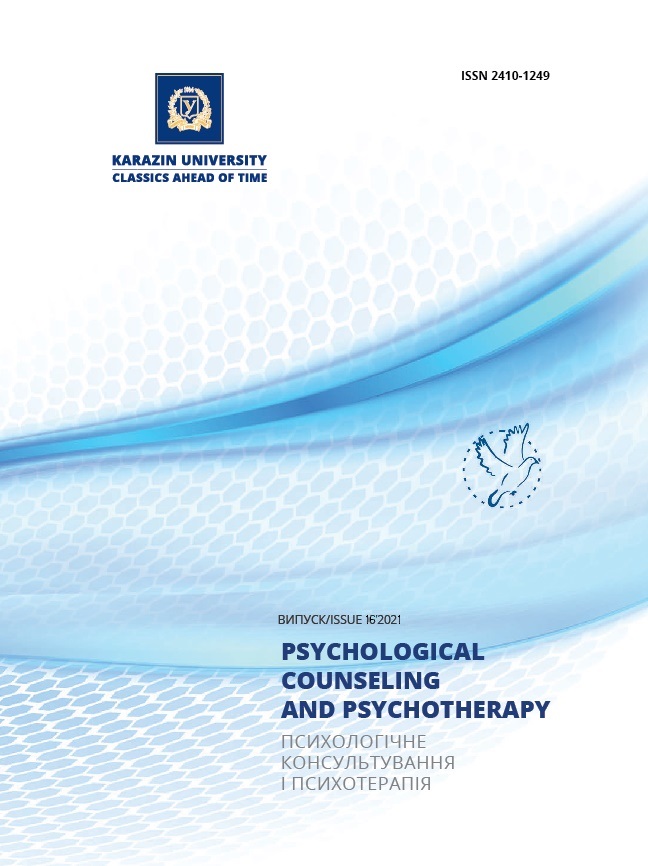Переживання та як впоратися з травмою на війні та у військових конфліктах
Анотація
У статті досліджуються методи лікування посттравматичних стресових розладів на війні та у військових конфліктах. У сучасній психіатрії та клінічній психології введено зовнішньо обумовлений психічний розлад – своєрідне наукове прийняття, яке ще не було раніше застосовано в системах класифікації психічних розладів. Особливу увагу приділяється новому діагностичному посібнику ICD-11-CM (International Classification of Diseases, 11 Revision, Clinical Modification), який вступає в дію з 01.01.2022, що приносить з собою великі інновації, особливо в діагностиці травм. Це також вплине на можливі лікувальні процедури та терапевтичні втручання. Тому в найближчі кілька років відбудеться серйозна зміна парадигми лікування. Відзначається, що експертне опитування Міжнародного товариства досліджень травматичного стресу щодо найкращої практики лікування комплексного посттравматичного стресу, показало що перевага віддається послідовному лікуванню, з основним акцентом на навичках подолання (включаючи втручання з регулювання емоцій) і на розповідях про травму пам’яті (з використанням різних терапевтичних прийомів). Незважаючи на існування дуже малої кількості рандомізованих терапевтичних досліджень, було задокументовано основний консенсус щодо найважливіших терапевтичних цілей.
Завантаження
Посилання
Beltran RO, Silove D, Llewellyn GM. Comparison of ICD-10 diagnostic guidelines and research criteria for enduring personality change after catastrophic experience. Psychopathology. 2009;42(2):113–8. https://doi.org/10.1159/000204761.
Brewin CR, Cloitre M, Hyland P, Shevlin M, Maercker A, Bryant RA, et al. A review of current evidence regarding the ICD-11 proposals for diagnosing PTSD and complex PTSD. Clin Psychol Rev. 2017;58:1–15. https://doi.org/10.1016/j.cpr.2017.09.001.
Briere J, Elliott DM, Harris K, Cotman A. Trauma symptom inventory: psychometrics and association with childhood and adult victimization in clinical samples. J Interpers Violence. 1995;10(4):387–401. https://doi.org/10.1177/088626095010004001.
Cloitre M, Courtois CA, Charuvastra A, Carapezza R, Stolbach BC, Green BL. Treatment of complex PTSD: results of the ISTSS expert clinician survey on best practices. J Trauma Stress. 2011;24(6):615–27. https://doi.org/10.1002/jts.20697.
Cloitre M. ICD-11 complex post-traumatic stress disorder: simplifying diagnosis in trauma populations. Br J Psychiatry. 2020;216(3):129–31. https://doi.org/10.1192/bjp.2020.43.
Eitinger L. Pathology of the concentration camp syndrome: preliminary report. Arch Gen Psychiatry. 1961;5(4):371–9. https://doi.org/10.1001/archpsyc.1961.01710160051006.
Gaebel W, Stricker J, Riesbeck M, Zielasek J, Kerst A, Meisenzahl-Lechner E, et al. Accuracy of diagnostic classification and clinical utility assessment of ICD-11 compared to ICD-10 in 10 mental disorders: findings from a web-based field study. Eur Arch Psychiatry Clin Neurosci. 2020;270(3):281–9. https://doi.org/10.1007/s00406-019-01076-z.
Horowitz MJ. Stress response syndromes. New York: Aronson; 1976.
Karatzias T, Murphy P, Cloitre M, Bisson J, Roberts N, Shevlin M, et al. Psychological interventions for ICD-11 complex PTSD symptoms: systematic review and meta-analysis. Psychol Med. 2019;49(11):1761–75. https://doi.org/10.1017/s0033291719000436.
Keeley JW, Reed GM, Roberts MC, Evans SC, Robles R, Matsumoto C, et al. Disorders specifically associated with stress: a case-controlled field study for ICD-11 mental and behavioural disorders. Int J Clin Health Psychol. 2016;16(2):109–27. https://doi.org/10.1016/j.ijchp.2015.09.002.
Krammer S, Simmen-Janevska K, Maercker A. In Richtung “Komplexe PTBS”: die deutsche version des trauma symptom inventory (TSI) zur Erfassung komplexer Traumafolgen. PPMP. 2013;63(8):318–26.
Maercker A, Brewin CR, Bryant RA, Cloitre M, Reed GM, van Ommeren M, et al. Proposals for mental disorders specifically associated with stress in the international classification of Diseases-11. Lancet. 2013;381(9878):1683–5. https://doi.org/10.1016/s0140-6736(12)62191-6
Maercker, A. Development of the new CPTSD diagnosis for ICD-11. bord personal disord emot dysregul 8, 7 (2021). https://doi.org/10.1186/s40479-021-00148-8
Reed GM, Sharan P, Rebello TJ, Keeley JW, Elena Medina-Mora M, Gureje O, et al. The ICD-11 developmental field study of reliability of diagnoses of high-burden mental disorders: results among adult patients in mental health settings of 13 countries. World Psychiatry. 2018;17(2):174–86. https://doi.org/10.1002/wps.20524.
Young A. The harmony of illusions: inventing post-traumatic stress disorder. Princeton: Princeton University Press; 1997.
WHO, International Statistical Classification of Diseases and Related Health Problems (ICD). (2021).








